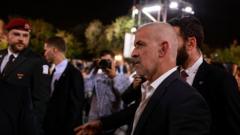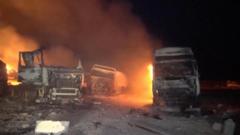Despite minor progress, complexities around hostage negotiations and governance persist amid escalating conflict.
**Qatar Reports Progress in Gaza Ceasefire Negotiations Amid Ongoing Violence**

**Qatar Reports Progress in Gaza Ceasefire Negotiations Amid Ongoing Violence**
Qatar's Prime Minister mentions small advancements in ceasing hostilities between Israel and Hamas while significant concerns remain.
In a statement reflecting on recent developments, Qatar’s Prime Minister Sheikh Mohammed bin Abdulrahman Al Thani noted "a bit of progress" in the ongoing efforts to establish a ceasefire between Israel and Hamas. However, he emphasized that a definitive resolution to end the conflict is still elusive. This statement follows his meeting with David Barnea, the head of Israel’s Mossad, in Doha.
During the meeting, Turkey's foreign minister Hakan Fidan indicated that Hamas seems more amenable to discussions aimed at reaching a long-term solution. Previously, Hamas rejected an Israeli proposal for a ceasefire, but now it appears they are open to negotiation that would encompass the release of all remaining hostages, potentially leading to a temporary halt in hostilities.
Hamas has proposed that as part of this accord, it might even consider disarming, contingent upon Israel's withdrawal of military forces from Gaza. Nevertheless, the Israeli government has been firm in its refusal to consider such a withdrawal.
The violence has escalated significantly since early March, when Israel imposed a blockade on Gaza and initiated extensive military operations. The latest figures from the Hamas-led health ministry indicate that over 2,151 Palestinian casualties have been reported, with Israeli military sources confirming the loss of lives among their ranks as well.
Sheikh Mohammed reiterated the need for a mutual goal in negotiations, voicing concerns about the lack of a common objective between conflicting parties. Current discussions also involve Hamas conveying its willingness to transfer governance in Gaza to a mutually agreed-upon Palestinian governance structure, which could involve the Palestinian Authority (PA) or an alternative administrative body.
However, Prime Minister Netanyahu has dismissed any role for the PA in Gaza’s governance and opposes the establishment of a Palestinian state. Recent political moves include PA President Mahmoud Abbas appointing a close aide to a prominent position within the Palestine Liberation Organization just as criticisms of his leadership surface regarding the ongoing discord with Hamas.
Moreover, the humanitarian situation in Gaza has deteriorated rapidly, with the UN World Food Programme declaring its food reserves depleted due to the blockade. Sheikh Mohammed criticized what he termed Israel's "starvation" tactics against the Gaza populace, further complicating negotiations for a ceasefire.
The ongoing conflict, which erupted on October 7, 2023, has transformed the Gaza Strip into a devastation zone, highlighting urgent need for a resolution to avoid further humanitarian crises.
During the meeting, Turkey's foreign minister Hakan Fidan indicated that Hamas seems more amenable to discussions aimed at reaching a long-term solution. Previously, Hamas rejected an Israeli proposal for a ceasefire, but now it appears they are open to negotiation that would encompass the release of all remaining hostages, potentially leading to a temporary halt in hostilities.
Hamas has proposed that as part of this accord, it might even consider disarming, contingent upon Israel's withdrawal of military forces from Gaza. Nevertheless, the Israeli government has been firm in its refusal to consider such a withdrawal.
The violence has escalated significantly since early March, when Israel imposed a blockade on Gaza and initiated extensive military operations. The latest figures from the Hamas-led health ministry indicate that over 2,151 Palestinian casualties have been reported, with Israeli military sources confirming the loss of lives among their ranks as well.
Sheikh Mohammed reiterated the need for a mutual goal in negotiations, voicing concerns about the lack of a common objective between conflicting parties. Current discussions also involve Hamas conveying its willingness to transfer governance in Gaza to a mutually agreed-upon Palestinian governance structure, which could involve the Palestinian Authority (PA) or an alternative administrative body.
However, Prime Minister Netanyahu has dismissed any role for the PA in Gaza’s governance and opposes the establishment of a Palestinian state. Recent political moves include PA President Mahmoud Abbas appointing a close aide to a prominent position within the Palestine Liberation Organization just as criticisms of his leadership surface regarding the ongoing discord with Hamas.
Moreover, the humanitarian situation in Gaza has deteriorated rapidly, with the UN World Food Programme declaring its food reserves depleted due to the blockade. Sheikh Mohammed criticized what he termed Israel's "starvation" tactics against the Gaza populace, further complicating negotiations for a ceasefire.
The ongoing conflict, which erupted on October 7, 2023, has transformed the Gaza Strip into a devastation zone, highlighting urgent need for a resolution to avoid further humanitarian crises.




















